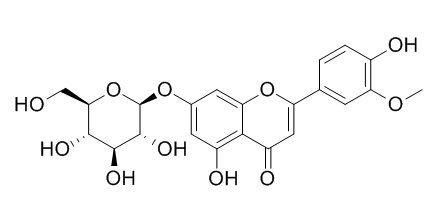Chrysoeriol-7-O-glucoside
Chrysoeriol-7-O-glucoside can strongly inhibit the classical pathway of the complement system.Chrysoeriol-7-O-d-glucoside and luteolin-7-O-d-glucoside can inhibit palmitic acid uptake into small intestinal brush border membrane, apigenin-7-O-d-glucoside can inhibit alpha-amylase activity; they can enhance norepinephrine-induced lipolysis in fat cells.
Inquire / Order:
manager@chemfaces.com
Technical Inquiries:
service@chemfaces.com
Tel:
+86-27-84237783
Fax:
+86-27-84254680
Address:
1 Building, No. 83, CheCheng Rd., Wuhan Economic and Technological Development Zone, Wuhan, Hubei 430056, PRC
Providing storage is as stated on the product vial and the vial is kept tightly sealed, the product can be stored for up to
24 months(2-8C).
Wherever possible, you should prepare and use solutions on the same day. However, if you need to make up stock solutions in advance, we recommend that you store the solution as aliquots in tightly sealed vials at -20C. Generally, these will be useable for up to two weeks. Before use, and prior to opening the vial we recommend that you allow your product to equilibrate to room temperature for at least 1 hour.
Need more advice on solubility, usage and handling? Please email to: service@chemfaces.com
The packaging of the product may have turned upside down during transportation, resulting in the natural compounds adhering to the neck or cap of the vial. take the vial out of its packaging and gently shake to let the compounds fall to the bottom of the vial. for liquid products, centrifuge at 200-500 RPM to gather the liquid at the bottom of the vial. try to avoid loss or contamination during handling.
Advances in Traditional Medicine2020, 10.1007
South African J of Botany2020, 135:50-57
RSC Advances2017, 86
Fitoterapia.2024, 175:105955.
J Med Food.2020, 23(6):633-640.
Acta Physiologiae Plantarum2015, 37:1736
Phytother Res.2020, 34(4):788-795.
Molecules.2024, 29(6):1240.
Molecules.2022, 27(7):2116.
Food and Chemical Toxicology2020, 111221
Related and Featured Products
J Agric Food Chem . 2019 May 1;67(17):4967-4975.
Safety Assessment of Phytochemicals Derived from the Globalized South African Rooibos Tea ( Aspalathus linearis) through Interaction with CYP, PXR, and P-gp[Pubmed:
30955332]
Abstract
Rooibos tea ( Aspalathus linearis) is a well-known South African herbal tea enjoyed worldwide. Limited reports indicate the potential of rooibos tea to alter the activity of certain cytochrome P450 (CYP450) isozymes. In this study, the phytochemical investigation of MeOH extract of A. linearis (leaves and stems) resulted in the isolation and characterization of 11 phenolic compounds. The MeOH extract exhibited significant inhibition of the major human CYP450 isozymes (CYP3A4, CYP1A2, CYP2D6, CYP2C9, and CYP2C19). The strongest inhibition was observed by the extract for CYP3A4 (IC50 1.7 ± 0.1 μg/mL) followed by CYP2C19 (IC50 4.0 ± 0.3 μg/mL). Among the tested phytochemicals, the most potent inhibitors were isovitexin on CYP3A4 (IC50 3.4 ± 0.2 μM), vitexin on CYP2C9 (IC50 8.0 ± 0.2 μM), and thermopsoside on CYP2C19 (IC50 9.5 ± 0.2 μM). The two major, structurally related compounds aspalathin and nothofagin exhibited a moderate pregnane-X receptor (PXR) activation, which was associated with increased mRNA expression of CYP3A4 and CYP1A2, respectively. These results indicate that a high intake of nutraceuticals containing rooibos extracts may pose a risk of herb-drug interactions when consumed concomitantly with clinical drugs that are substrates of CYP enzymes.
Keywords: Aspalathus linearis; CYP450; aspalathin; flavonoids; rooibos.
Phytother. Res., 2003, 17(10):1195–8.
Anti-obesity action of Salix matsudana leaves (Part 2). Isolation of anti-obesity effectors from polyphenol fractions of Salix matsudana.[Pubmed:
14669255 ]
METHODS AND RESULTS:
Previously, it was reported that polyphenol fractions prepared from the leaves of Salix matsudana reduced the elevation of the rat plasma triacylglycerol level at 3 and 4 h after oral administration of a lipid emulsion containing corn oil, at a dose of 570 mg/kg. Moreover, body weights at 2-9 weeks and the fi nal parametrial adipose tissue weights were significantly lower in mice fed the high-fat diet with 5% polyphenol fractions of S. matsudana leaves than in those fed the high-fat diet alone. The polyphenol fractions of S. matsudana leaves also significantly reduced the hepatic total cholesterol content, which was elevated in mice fed the high-fat diet alone. In addition, the polyphenol fractions of S. matsudana leaves inhibited palmitic acid uptake into brush border membrane vesicles prepared from rat jejunum and alpha-amylase activity, and their fractions enhanced norepinephrine-induced lipolysis in fat cells.
To clarify the active substances inhibiting the palmitic acid uptake into small intestinal brush border membrane, the alpha-amylase activity or enhancing the norepinephrine-induced lipolyis in fat cells, the isolation of the active substances from polyphenol fraction was attempted using the above three assay systems. Compounds 1, 2 and 3 were isolated from the polyphenol fractions and identified as apigenin-7-O-d-glucoside, luteolin-7-O-d-glucoside and chrysoeriol-7-O-d-glucoside, respectively.
CONCLUSIONS:
Among three flavonoids, apigenin-7-O-d-glucoside inhibited alpha-amylase activity, and luteolin-7-O-d-glucoside and chrysoeriol-7-O-d-glucoside(Chrysoeriol-7-O-glucoside) inhibited palmitic acid uptake into small intestinal brush border membrane. Furthermore, three flavonoid glucosides enhanced norepinephrine-induced lipolysis in fat cells.



